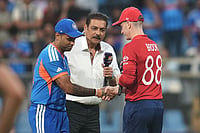Palestinian national poet Mahmoud Darwish’s works are seeped in the sights and sounds and sorrows of his beloved homeland. Placed under house arrest in his youth for his political activism and poetry, Mahmoud spent 26 years of his life in exile, between Paris and Beirut. Palestinian cities and villages, lakes and rivers, orange trees and olive groves, garlic and wheat and bread—pivotal symbols of Palestinian culture and history found a place in the poet in exile’s writing. He explored the themes of belonging and displacement, identity and alienation, giving a powerful and passionate voice to the Palestinian struggle. “My homeland is not a suitcase,” he declared. Calling all Palestinians to resist occupation and colonisation, he wrote, “This land promises wheat and stars…We are its wound, but a wound that fights.”
If we want to
We will become a people, if we want to, when we learn that we are not angels, and that evil is not the prerogative of others
We will become a people when we stop reciting a prayer of thanksgiving to the sacred nation every time a poor man finds something to eat for his dinner
We will become a people when we can sniff out the sultan’s gatekeeper and the sultan without a trial
We will become a people when a poet writes an erotic description of a dancer’s belly
We will become a people when we forget what the tribe tells us, when the individual recognizes the importance of small details
We will become a people when a writer can look up at the stars without saying: ‘Our country is loftier and more beautiful!’
We will become a people when the morality police protect a prostitute from being beaten up in the streets
We will become a people when the Palestinian only remembers his flag on the football pitch, at camel races, and on the day of the Nakba
We will become a people, if we want to, when the singer is allowed to chant a verse of Surat al-Rahman at a mixed wedding reception
We will become a people when we respect the right, and the wrong.
***
Green flies
The scene is the same as ever. Summer and sweat, and an imagination incapable of seeing beyond the horizon. And today is better than tomorrow. But the dead are what’s new. They’re born every day and when they’re trying to sleep death takes them away from their drowsiness into a sleep without dreams. It’s not worth counting them. None of them asks for help from anyone. Voices search for words in the open country, and the echo comes back clearly, woundingly: ‘There’s nobody here.’ But there’s somebody who says: ‘It’s the killer’s right to defend the killer instinct,’ while the dead say belatedly: ‘It’s the victim’s right to defend his right to scream.’ The call to prayer rises to accompany the indistinguishable funerals: coffins hastily raised in the air, hastily buried – no time to carry out the rites, more dead are arriving at speed from other raids, individually or in groups, or a whole family with no orphans or grieving parents left behind. The sky is leaden grey and the sea blue grey, but the colour of blood is hidden from the camera by swarms of green flies.

***
The law of fear
The killer looks at the spectre of the dead man, not into his eyes, without regret. He says to those around him: ‘Don’t blame me. I’m afraid. I killed because I’m afraid, and I’ll kill again because I’m afraid.’ Some of those present, accustomed to favouring psychological analysis over the laws of justice, say: ‘He is defending himself.’ Others, admirers of the idea that progress is superior to morality, say: ‘Justice emanates from the generosity of power. The victim should apologise for the trauma he has caused the killer.’ Scholars of the distinction between life and reality say:
‘If this ordinary event had taken place anywhere but here, in this holy land, would we have even known the victim’s name? Let us then turn our attention to comforting the frightened man.’ When they went down the road of sympathising with the killer, some foreign tourists passing by asked them: ‘What has the child done wrong?’ They answered: ‘He will grow up and frighten the frightened man’s son.’ ‘What has the woman done wrong?’ They said: ‘She will give birth to a memory.’ ‘What has the tree done wrong?’ They said: ‘A green bird will appear from it.’ And they shouted: ‘Fear, not justice, is the basis of power.’ The spectre of the dead man appeared to them from a cloudless sky and when they opened fire on him they did not see a single drop of blood, and they were afraid.
***
The humour of eternity
Graveyards have the dignity of air, the authority of dust. You say farewell to your friend, Mamduh, and await your turn. The smell of wilting flowers and the rustling of trees transport you far away, to the place that lies beyond matter, to your final address in some part of nothingness. But you are thinking about something simpler: graves are mattresses. They seem like comfortable places to sleep. An occupant of such a grave would not lie staring up at his earthy sky and, like his counterpart in the graveyard near the Place du Trocadéro in Paris, would be part of everyday life, being so close to cafés, museums and the social interplay of the living. Life is within reach of his marble headstone, and the abundance of flowers, trees, birds and people surrounding him makes it unnecessary for him to go out for walks, after he has spent his life savings on procuring the privacy of this permanent address. There are some graves that make nothingness visible, like those out in the desert, far from trees and water. There is no companionship for the sleeper there, who burns in the summer heat and freezes in the winter cold, as if he continues to die forever, where death has no metaphor in sleep. But those who oversee the construction of their graves, furnishing them with their photographs, do not think about the comfort to be had from sleeping in friendly proximity to the living, but only of training history to read. They think also of something more complex, of bribing eternity, failing to understand that eternity does not visit graves and loves to joke.
***
The second olive tree
The olive tree does not cry or laugh. Modest mistress of the hillsides, she covers her trunk with her shadow and does not divest herself of her leaves in the face of a storm. She stands as if sitting, and sits as if standing. She lives as sister to a friendly eternity and neighbour to time that entrusts her to store luminous oil and forget the names of invaders, with the exception of the Romans, who were her contemporaries and borrowed some of her branches to plait garlands. They did not treat her like a prisoner of war, but rather a respected grandmother whose superior dignity was mightier than the sword. In her restrained silvery greenness is a colour too shy to declare itself openly, a glance towards something beyond description, for she is neither green nor silver. She is the colour of peace, if peace needs a colour to distinguish it. Nobody says to her: ‘How beautiful you are!’ but they do say: ‘How venerable and sublime you are!’ It is she who trains soldiers to lay down their weapons, and drills them in homesickness and humility: ‘Return to your homes, and use my oil to light your lamps.’ But these soldiers, these new soldiers, surround her with bulldozers and uproot her. They crush our grandmother, so that now her branches are in the earth and her roots in the air. She did not weep or shout, but one of her grandsons, who witnessed the execution, threw a stone at a soldier and was martyred alongside her. When the soldiers left triumphantly, we buried him there, in the deep hole, our grandmother’s cradle. For some reason we were convinced that after a while he would become an olive tree, spiky and–green!
***
Who enters paradise first? The man killed by an enemy bullet or the man killed by a bullet from his brother’s gun? Some religious scholars say: ‘Your enemy could be your mother’s son.’
Religious scholars were perplexed over the identity of those lying in adjacent graves: were they martyrs for freedom, or victims fighting one another in the futile drama being enacted? They were unable to decide, but agreed on one thing: God knows best.
The killer is also killed.
He asked me: ‘Should a hungry watchman defend a house whose ownerhas gone on holiday to the French or Italian Riviera – never mind which?’ I said: ‘He shouldn’t.’
He asked me: ‘Does I + I = two?’ I said: ‘You and you are less than one.’
I am not embarrassed about my identity because it is still in the process of being invented, but I am embarrassed about some of what Ibn Khaldun says in his Muqaddima.
From now on you are somebody else.
(Excerpted from A River Dies of Thirst: Journals, translated by Catherine Cobham, with permission from Archipelago Books)

I asked you, but a shell searching for an evasive target interrupted me. We went down to a shelter and I asked you with a cunning you knew I had: When will the ships set sail? You said lightheartedly: Whereto? I said: To the unknown. To a new unknown. Is that not the path of meaning? You did not like my misplaced irony, as I had been laughing at a funeral, or weeping at a wedding. You looked away, walked off, and disappeared. You listened to the voice inside you calling and needling you whenever you reached a crossroads or an incline. Why, why did I come down from Mount Carmel? You did not believe those who believed you. They treated you as one might treat a bird that fell from its flock with a broken wing. They nursed you and taught you to fly, little by little, and so you did. They taught you how to sing and you sang, and said: I am what I will be.
In magical Cairo that stays up late, you dream you are in paradise. You get up at night and open the window to establish the existence of eternity whenever you see the Nile. But why did you come down from Mount Carmel? The question is absent for others, but present in you alone, secret and hidden like the phantom pains awakened by a severed body part. So you say: That’s enough! And you go back to sleep.
My question wakes you up: When will the ships set sail? You answer with a nervousness that lured meaning into absurdity: I will not leave! I remind you that Beirut is not Haifa. You had to say that there. You are ashamed of patching one mistake with another, so you add: I mean I will not leave by sea, because I cannot swim. I tease you a bit: But all your poetry is measured by the sea’s cadence, yet you do not know the sea? You calm down and say: The sea is a bed of aquatic metaphors. The sea is linguistic spectacle. The sea is rhythm.
We surfaced from the shelter to streets devoid of pedestrians or mortar. A deafening truce. The sky has been cleared of aircraft and filled with a dewy blue. You can count heartbeats now in the agonizing farewell to a revolution searching farther and farther for a path, to reach its land, which is just as apple’s throw away. I asked you: Did you go far away to be near, or did you come near to be distant? You said: The weather is not ideal for throwing salt on wounds or dissecting allusions.
You cried like never before. You cried with all your senses. You cried as if you were not crying, but melting all at once and raining. So I gathered you up and carried you to your tiny apartment on the eighth floor of a building that looks out to the sea where the ships will sail. Everything was crying. The low sky. The bullets bidding farewell to the fighters were crying. The streets were crying. Balconies, ruined buildings, slogans on city walls were crying. Rendezvous cast into the realm of the possible and impossible were crying…
I asked you: Do you not know how to love, then? I was astonished when you said: What is love? As if I had not loved, except when I imagined that I was in love. Such as when I am taken by a hand waving out of a train window – perhaps not meant for me – but I take it as such and kiss it from afar. Or when I see a girl waiting for someone at the entrance of a cinema and I imagine that I am that someone and take a seat next to her and see myself with her on the screen during a romantic scene. I do not care whether I am happy or sad by the end of the film. Because I look for her in what comes after the end. I do not find her next to me after the curtain falls.
I asked you: Were you acting, my friend?
You said: I used to invent love when necessary. When I walked alone on the riverbank. Or whenever the level of salt would rise in my body, I would invent the river.
(Excerpted from In the Presence of Absence, translated by Sinan Antoon, with permission from Archipelago Books)
(This appeared in the print as 'The Olive Tree Does Not Cry or Laugh')




























